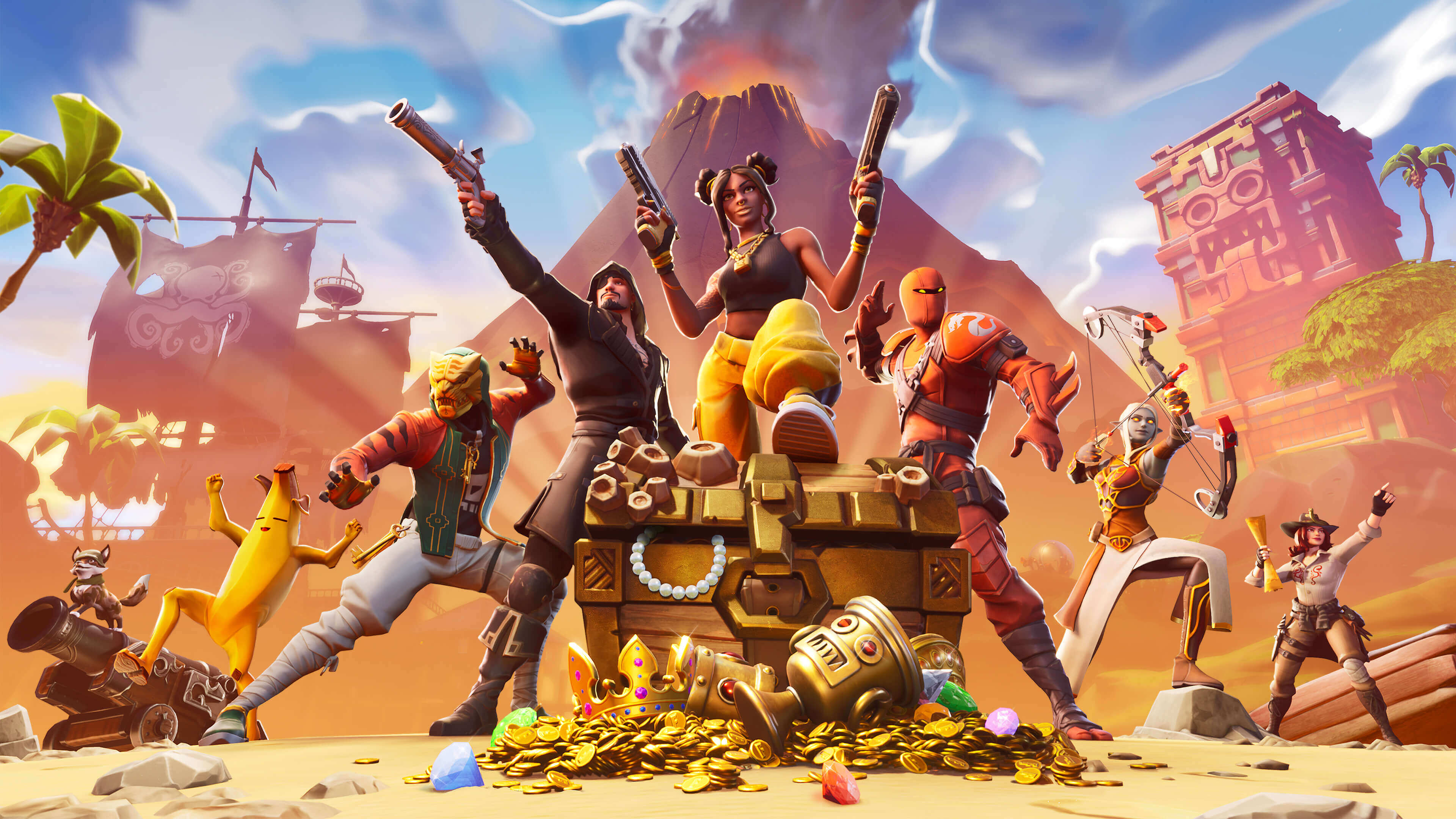 It's hard to say how Fortnite is turning out because it keeps turning into something else. Skins and storylines come and go. Landmarks appear and disappear. Weapons are added and removed. Recently, a mysterious excavation site appeared, but it was dug up and abandoned by the time I got there the next day.
It's hard to say how Fortnite is turning out because it keeps turning into something else. Skins and storylines come and go. Landmarks appear and disappear. Weapons are added and removed. Recently, a mysterious excavation site appeared, but it was dug up and abandoned by the time I got there the next day.
As I'm writing this, players are angry about a gameplay change that will probably be replaced by something new to hate a month from now. There's never a perfect time to say what Fortnite is.
But here's what it is:
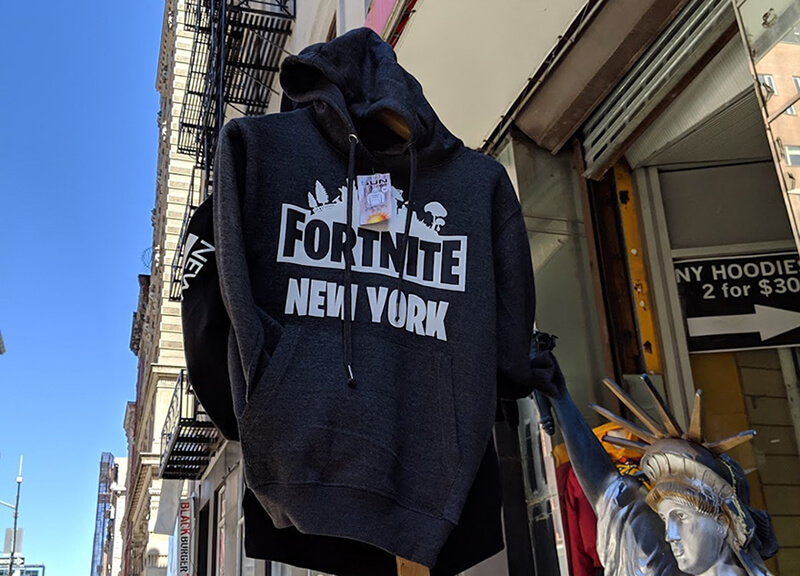
My colleague Paul took this photo last week while out in New York City, where we live. Fortnite has nothing to do with New York, and New York has nothing to do with Fortnite, though that may change when the game's $30 million World Cup descends on us in July. I laughed at this photo for a long time. "Yeah, OK," I said. "This makes sense."
Fortnite: Battle Royale launched in early access on September 26, 2017, a spin-off from developer Epic's co-op building game Fortnite: Save the World. More than a year and a half later, it's an unfinished game that's nevertheless garnered 250 million players and made an estimated billions of dollars. It's free to play on consoles, PC, and mobile, making it easy for basically anyone to access. It's an unfinished game that's ubiquitous, not just to those of us who play video games, but to parents and teachers and athletes and musicians. It's seeped into our lives through Halloween costumes and contentious dances. It's arguably inspired more games to add battle passes, a monetization strategy that's overtaking increasingly gauche loot boxes. Its success helped launch the Epic Games Store, challenging Valve's long-standing dominance of the PC marketplace. It means so many things, is in so many places, that it's ended up on this nonsensical sweatshirt.
There are tourists who will see this sweatshirt as a good gift for someone back home who's mentioned Fortnite at some point, because someone probably has. Millions of people could be given this sweatshirt, and it would mean something, whether as an ironic "look how ridiculous this is" or an earnestly special gift.
Both the irony and the earnestness are right at home in Fortnite. Almost everyone who plays it can find something to like, whether that's a cute skin, a cool thing they built, or a free way to hang out with their friends. They can also find a bunch of stuff they don't like: annoying or hateful teammates, an overpowered sword, or a constantly changing competitive scene. The game is stuffed with stuff, as full of ridiculous nonsense as it is real moments of victory, excitement, and connection.
In some ways, Fortnite is a lot like any other battle royale. One hundred players---alone, in duos, or in squads of four---leap from a flying bus onto an island. The map's usable area shrinks as a brightly colored storm, which damages players, closes in. Players scavenge for guns, ammo, explosives, and shield potions, which they use to destroy each other or outlive destruction. Only one team can win.
Weapons are divided into rarities, depicted by color, that dictate their power. There's none of PUBG's or Apex Legends' attachments; that gun you picked up is as good as it's going to get. This absence makes gearing up for the fight tighter than in other battle royales, though the actual gunplay can feel floaty and imprecise. Apart from guns, there are ridiculous weapons that come and go regularly: grenades that make enemies dance or turn their feet to blocks of ice, launchers that fire rockets you can ride on, boomboxes that destroy buildings. Your favorite strategy one week might be useless the next. But for players like me who don't enjoy forming opinions on a game's best gun, Fortnite's copious items give me fun or silly things to do that can still contribute to winning a match. The more frivolous stuff, when dropped into Fortnite's bright, gore-free world, gives the game a lighthearted vibe that papers over the disturbing brutality of its core dictate, which is to ruthlessly murder everyone you meet.
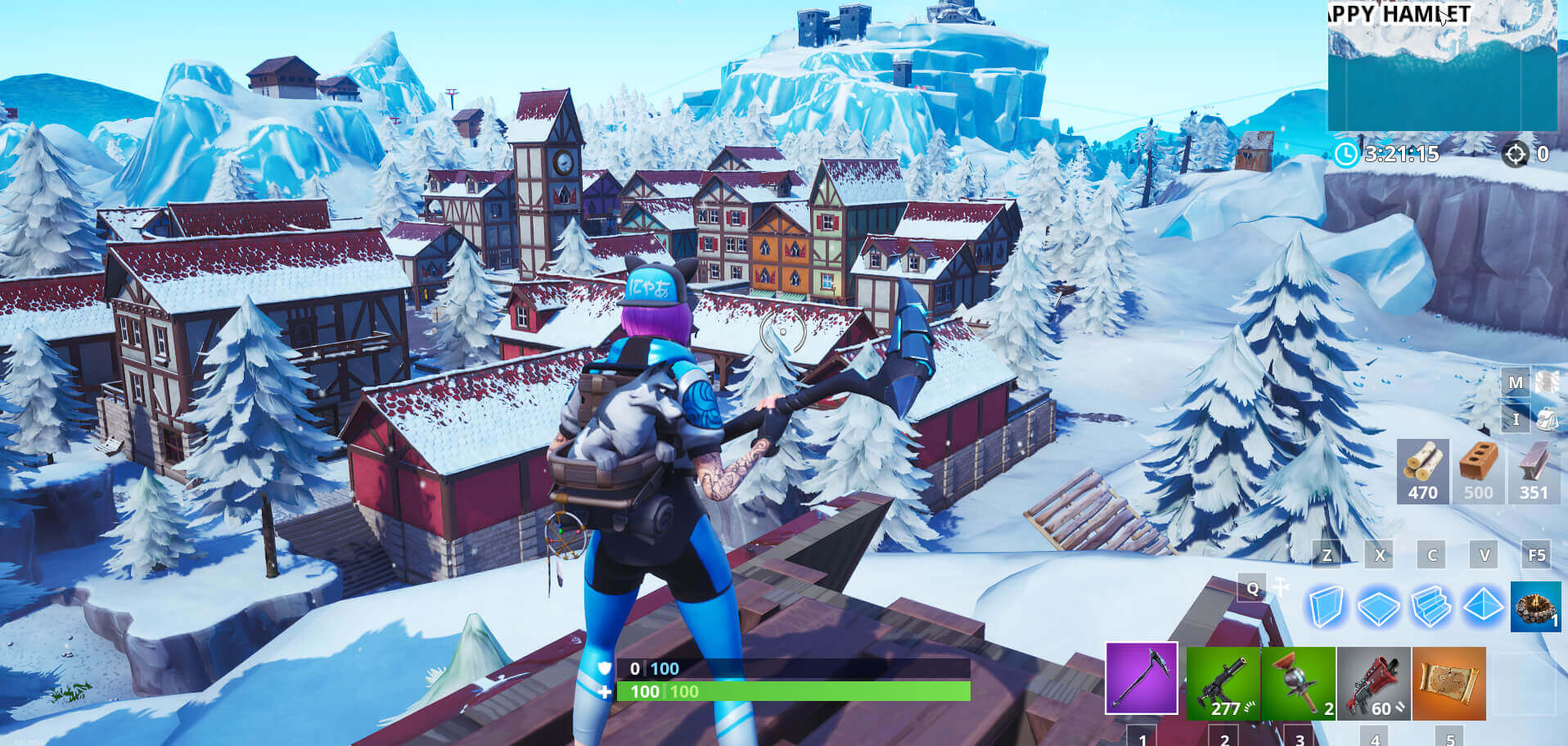
Sometimes these items are sequestered into their own modes, which also change regularly. There are 50-player team battles, modes where you have to capture a dance floor or defend a food mascot, and modes where lava gradually fills the map. Sometimes there are events: a rocket launch, a cube exploding, a concert. These modes and events, like the different items, give players a change of pace. They can encourage working together, trying out new tactics, or just doing something absurd.
But what really separates Fortnite from other murder-to-win games is the unique building mechanic. Using your starting weapon, a pickaxe, you can harvest almost all of the game world's features for materials. Trees and fences will get you wood, walls and rocks will get you stone, and staircases and cars will get you metal. Even if you can't find a weapon, you always have something. You might not be able to outshoot another player, but you can outbuild them. You can knock down a skyscraper and create your own in its place. You can turn an empty field into a maze of ramps and walls and traps.
In other battle royales, you can tell a place has already been looted by open doors or empty chests. In Fortnite, a visited place is a frantic wreckage of destroyed infrastructure, of ramps snaking up hillsides, of zigzagging towers flecked with loot that a downed player's killers didn't want. The architecture of desire built over a place's original design tells a story of what might have happened: the exact path someone took, the ebb and flow of a build fight. Players take the space Fortnite's developers created and change it, make it their own. Then it's destroyed, or the match ends, and everyone starts over again.
Recently, I jumped into Fortnite's Playground mode, which lets you explore the map or practice skills without the pressure of an actual match. I walked the entirety of the map, or at least the current one---places and landscapes get renamed or replaced often. I'd never spent much time considering how the security cameras at Snobby Shores make the town feel like a home for the rich and paranoid, or taken the time to admire the charming '50s nostalgia of Paradise Palms. Fortnite's world is lovely when you aren't getting shot at or desperately hunting for loot.
But it didn't feel right. Nothing seemed to be where I thought it was, and it wasn't just due to map changes. I'd pictured Lonely Lodge less to the east, Pleasant Park closer to the center. A lot of my sense of the map was created by where the battle bus cuts across at the start of each multiplayer round. Learning the map and picking the right landing spot is part of the game's strategy, but I hadn't realized how situational my sense of Fortnite's world really was until I traversed it outside of a match. Without the actions of 99 other players directing my movements, the game's world just wasn't the same.

In his 1979 article "Space and Place: Humanistic Perspective," geographer Yi-Fu Tuan writes about the ways in which humans give a space character and qualities through being in and interacting with them:
A place that evokes affection has personality in the same sense that an old raincoat can be said to have character. The character of the raincoat is imparted by the person who wears it and grows fond of it...People demonstrate their sense of place when they apply their moral and aesthetic discernment to sites and locations.
When I picture Fortnite, my places aren't the named landmarks. They're an empty stretch where I got ambushed by another squad, a tree I fell out of to my death when I forgot Epic had removed glider redeploy, the shack I ducked into to heal when I just managed to outrun the storm. Tuan calls such random places "fields of care," places that are created by personal knowledge rather than universal or prescribed importance. (Think your local bar versus Stonehenge.) He writes that "fields of care...lack visual identity. Outsiders find [them] difficult to recognize and delimit."
Fortnite's map doesn't really stand out from other battle royales. Cute names aside, it has a lot of empty space that can make parts of the game feel tedious. But the game excels at giving players fields of care. The building mechanic lets you make a space your own, if even just for a match. Challenges---changing tasks that players complete to level up their battle pass---make areas we'd never go to memorable. The Block area of the map hosts a changing roster of player creations, all of which mean something unique to the creator and their friends. The game's massive player base creates a dizzying range of possibilities for its world. Its unique space is created not just by so many people having their own experiences there, but somehow forging group ones, like landing at Tilted to prove yourself or thanking the bus driver when you jump off the battle bus. All of its colorful locales would be graveyards, all of its wacky items trash, if there weren't so many people forming the game's world alongside you.
One afternoon, a small voice began chattering as soon as I loaded into a game. "Guess how old I am!" they kept saying. The third member of our lopsided squad finally guessed, "Umm...13?" in the bright voice of an adult talking to a kid. "Seven!" the kid responded proudly. As we looted our way through the castle at Polar Peak, I admired the careful effort my adult squadmate made to explain what we were doing to a kid who was mostly interested in firing ammo into the air and tumbling off the peak in a hamster ball vehicle.
When the storm forced us to move, the adult and I positioned ourselves strategically around the kid, scanning the horizon and trying to keep them from getting too far ahead. We got in a firefight and survived, barely, thanks to the adult's skill and the kid's spray-and-pray strategy. Our looting for desperately needed gear got cut short by the storm catching up with us again. We had a long, long run to its new perimeter. "I have a campfire, should I drop it?" the kid kept asking, and my teammate patiently explained why the immobile healing item would be better used later. "I think we can make it!" I shouted, and the adult chuckled incredulously, "Really?" But it kept our spirits up as our health ticked down. We just barely made it alive, only to be promptly decimated by another squad taking advantage of our single-digit health bars. The kid was upset, but the adult praised them up and down, recounting our epic run through the storm and all the fun we'd had. Afterward, the kid sent me a friend request I still haven't accepted.
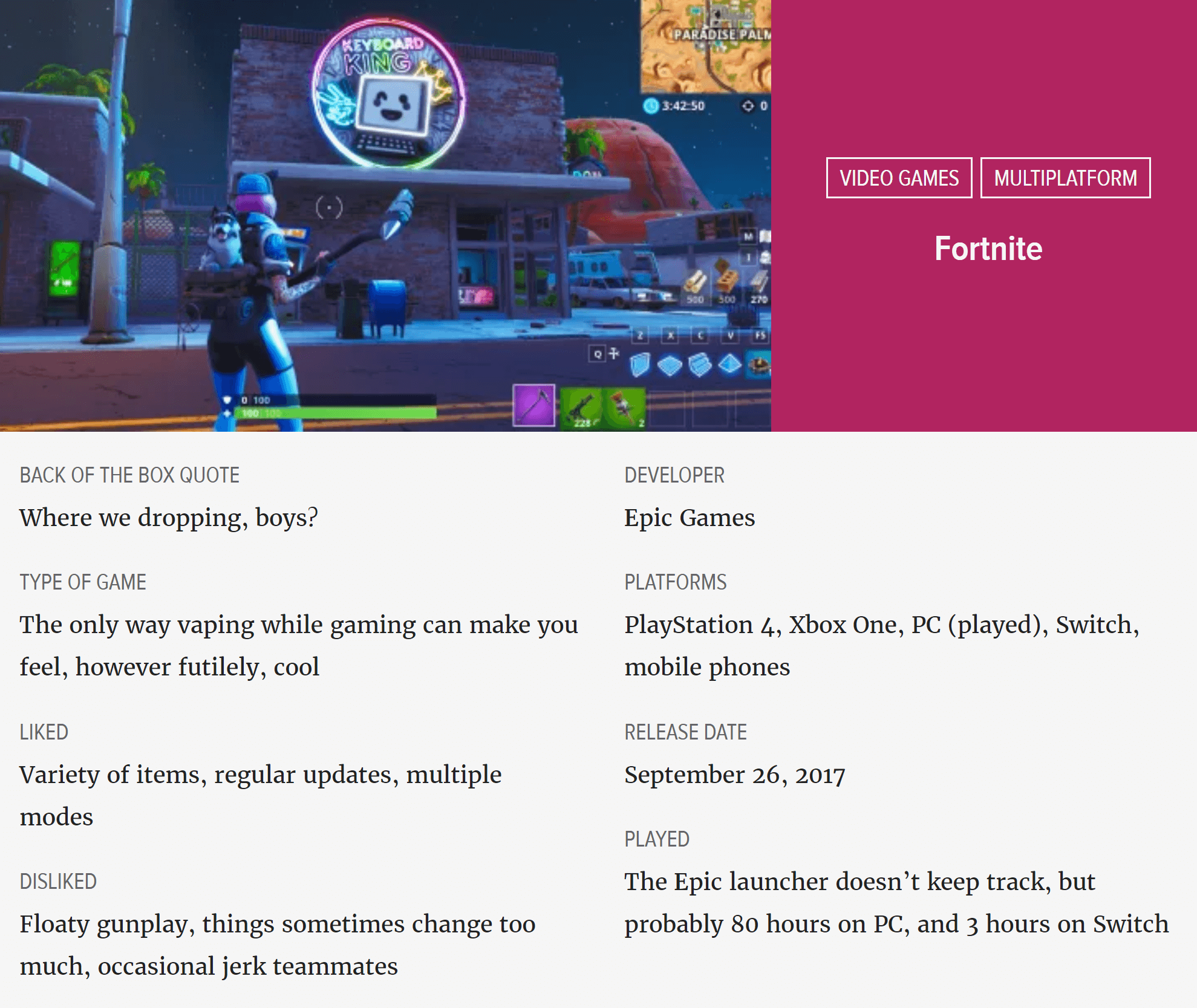
Fortnite, against my expectations, is full of these weird, positive moments with teammates. There were the players who wanted to conga and, when we got separated, went to conga somewhere else until they both fell off a mountain, narrating the whole thing through their mics so I could picture it from afar. There was the polite kid with a Southern accent who left me to die when I got downed, only to suddenly cry, "Oh no, I forgot my teammate!" and try, futilely, to get back to me before I died. More than half my matches were with Spanish speakers, and we tried largely unsuccessfully to communicate with each other, wasting precious seconds fumbling for the right words but mostly laughing through it all. I'm often matched with kids, like the young teammate I spectated who got all the way to the final two solely by hiding with a steely patience that I, an ex-Zen Buddhist, would have found impossible to muster. I love the sense of possibility I feel any time I jump into a match.
In-game, Fortnite is populated by a whole lot of weirdos. Players customize their avatars through the skins and accoutrements---gliders, backpacks, emotes, and pickaxes---that they buy from the store or earn through ranking up their battle pass. Currently, my avatar is a girl in a cropped hoodie who carries a black-and-white dog in a backpack. When she jumps off the battle bus, she floats to the ground on a palm tree-like umbrella that I earned for winning a match in Season 8. I don't like the umbrella as much as my previous glider, but I equipped it the moment I got it, because it told other players I'd won at least one match. It is, to date, the only match I've won this season, but no one needs to know that.
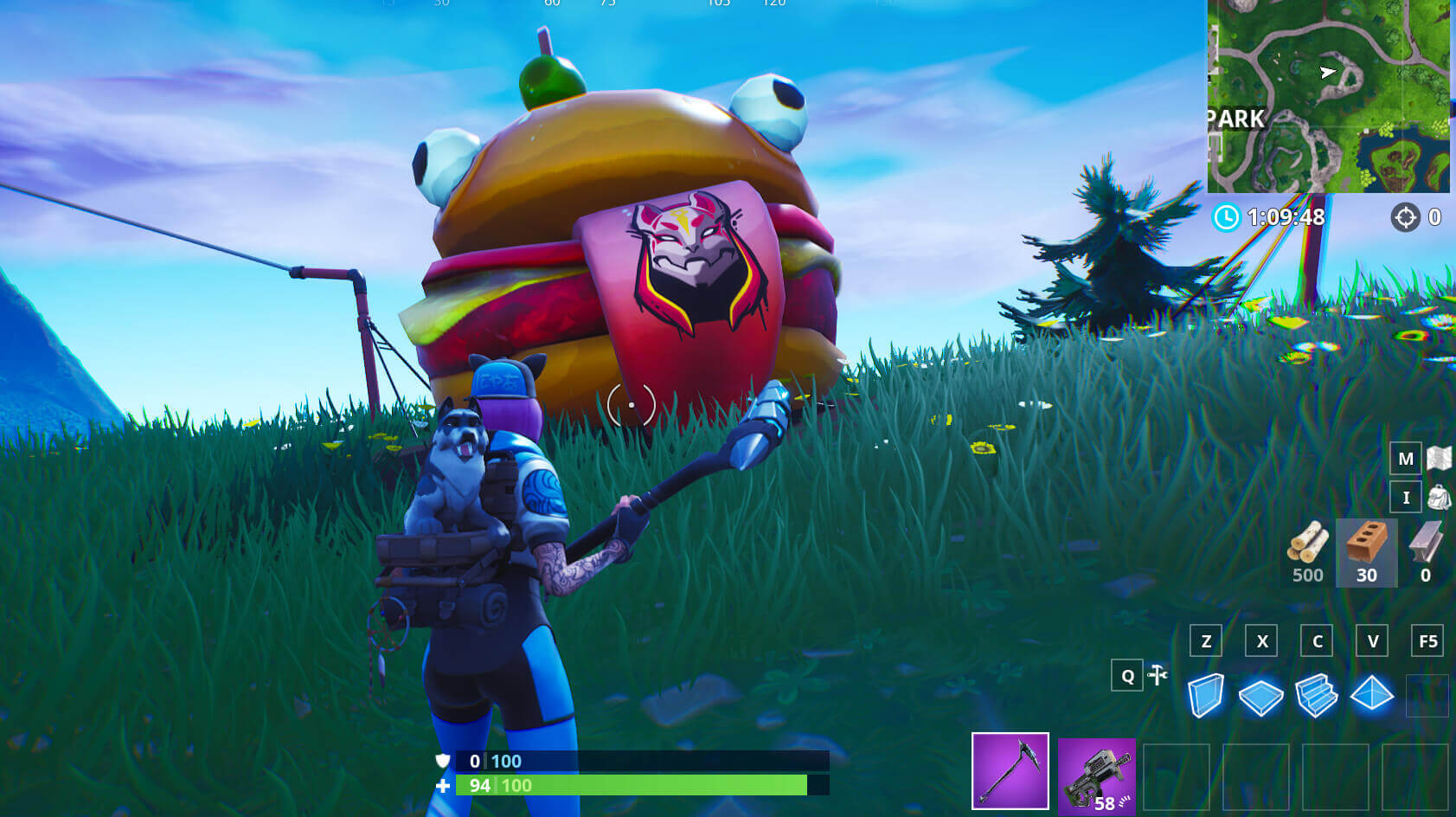
The number of ways players can express themselves in Fortnite makes the game feel chaotic and sometimes crowded, but also lively. Your foes can be a phalanx of black-hooded Ice Kings cresting a ridge to murder you or a gaggle of pink panda Cuddle Team Leaders firing themselves at you from cannons. They're a creepy banana. They're maligned soccer players. In past seasons, high-level players would wear the default skins everyone started with to trick others into thinking they were new. In Season 3, a skin of Keanu Reeves as action movie character John Wick (the skin is actually called The Reaper) was the top-tier reward for the battle pass. I'd actually get scared if I saw one.
Never knowing who you'll encounter cuts both ways. There were adults who berated my every decision. There was a kid who screamed into their mic the whole match, a squadmate who played their television into their mic at ear-splitting volume seemingly on purpose. There were the usual slurs and threats and shitty talk. There were a few teams I quit the moment someone spoke. But the size of the player base and the game's popularity mean there's always a new squad to join, new people to find. If I don't like who I'm matched with, I can find someone new.
In almost all of the Fortnite matches I've played, at least one person has left their mic open. Mixed in with the game's sounds of explosions and clanging pickaxes are dogs barking, a bird chattering. The rattle of a gunfight is accented with the sizzle of a frying pan in someone's kitchen or the sharp tone of a loved one demanding someone stop playing to eat. This background busyness feels right at home with all the chaos and stuff going on inside the game.
It's this fullness, this being stuffed to the gills with constantly changing stuff, that makes that "Fortnite New York" sweatshirt make sense. It's also what makes Fortnite what it is, what keeps people coming back. We want one new game, one new squad, one new experience. Fortnite players loved Kevin the cube, but we wanted to know what he would do next. Season 8's volcano is cool, but is it going to erupt? We want all the stuff, even when we hate it or it makes no sense. There are so many people, so many places, so many things, that Fortnite risks veering off into meaninglessness, into the same cacophony that fills my headphones as I play or the same confusion I felt when Paul sent me the picture of that sweatshirt. But Fortnite wouldn't be Fortnite without it.
